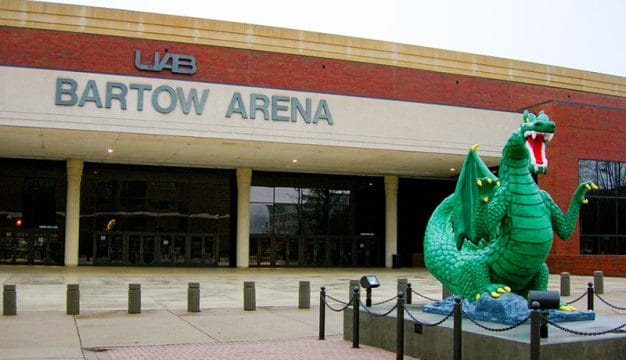Central Alabama Community College
 Central Alabama Community College
Central Alabama Community College (CACC) is a public community college headquartered in Alexander City, Tallapoosa County. CACC consists of four campuses: the Alexander City Campus, Pratt’s Mill Center in Prattville, Autauga County, and the Childersburg Campus and Talladega Center, both in Talladega County.
Central Alabama Community College
Central Alabama Community College (CACC) is a public community college headquartered in Alexander City, Tallapoosa County. CACC consists of four campuses: the Alexander City Campus, Pratt’s Mill Center in Prattville, Autauga County, and the Childersburg Campus and Talladega Center, both in Talladega County.
In 1963, Gov. George C. Wallace and the Alabama State Legislature established numerous two-year post-secondary institutions and trade schools under the State Board of Education. Alexander City Junior College was among the schools founded that year, and the campus opened in 1965. Classes were held at the former Russell Hospital beginning on September 30, 1965, with 442 enrolled freshmen. Local textile manufacturer Russell Mills, Inc. (present-day Russell Corporation) donated the property, which was valued at $750,000. In 1966, the Alexander City State Junior College campus moved to its current location on Cherokee Road just east of U.S. Highway 280. Governor Wallace led the dedication ceremony with a speech and the Administration Building on campus was named in his honor. A new library was completed in January 1969 and the school was accredited that year by the Southern Association of Colleges and Schools Commission on Colleges (SACS). In January 1971, a Health, Education, and Arts (HEA) Complex was opened. In February 1989, a Wellness Center was added to the HEA Complex and was renovated in 2000. The Betty Carol Graham Technology Center was completed in 2004 and classes were held there starting that fall semester. (Graham served for 16 years in the Alabama House of Representatives and was CACC Dean of Students from 1992 to 2008.) During the fall 2013 semester, the campus’s John D. Russell Library was replaced with a new Learning Resource Center. It houses a collection of materials from Confederate soldiers from Alabama, slave narratives, and local Native American artifacts.
The Childersburg campus was previously the N. F. Nunnelley State Technical College, which opened in 1966. (Newman F. Nunnelley had been principal of Talladega High School and superintendent of Talladega County public schools.) A number of people were involved in establishing the college, including Congressman William F. “Bill” Nichols, along with governmental entities and other organizations. The city of Childersburg, for instance, donated $24,000 for the purchase of 25 acres of land for the campus. The college opened on March 7, 1966, with 35 enrolled students. That September, Governor Wallace delivered an address at the dedication that was attended by more than 1,500. In 1973, the college earned accreditation from SACS and received federal grants that year as well as in 1979 and 1985 that enabled the school to expand its physical plant facilities, program offerings, and student services. The State Board of Education merged Alexander City Junior College and Nunnelley on February 23, 1989, to create the CACC. In 2006, Nunnelley opened an instructional site in Talladega, the Talladega Center, with 130 students in its first semester. The Center partners with state programs and agencies providing workforce development services, including Alabama JobLink, Employment Services, Vocational and Rehabilitation Services, Adult Education, and works with the Department of Veteran Affairs to find and provide employment and training opportunities for former military personnel. In spring 2015, the Center began offering evening classes at the Millbrook Instructional Site at Stanhope-Elmore High School in Elmore County. That facility was moved to nearby Prattville in the Pratt’s Mill Center in 2018.
In 1996, CACC merged with the Coosa Valley School of Nursing. It had opened in 1921 as the Sylacauga School of Nursing, providing a hospital diploma program. The school was renamed the Coosa Valley School of Nursing in 1994 and began granting associates degrees in nursing that year. Coosa Valley School of Nursing had partnered with CACC since 1972 in various programs, and in 1996 fully merged with CACC.
CACC has three different associate degree programs: Science, Applied Science, and Occupational Technology. There are more than 30 associate degrees in science designed for students who plan to transfer to a four-year institution and pursue degrees in the liberal arts, sciences, health and nutrition, and other fields. CACC also offers associates degrees in applied science, with eight programs intended for students who plan to gain employment based on their specific program of choice and the skills learned: computer information science, general business, industrial electronics technology, licensed practical nurse to registered nurse mobility option, medical assisting, office administration, registered nursing, and automotive manufacturing technology. The school offers three different programs for associate degrees in occupational technology: machine shop operations, cosmetology, and welding. These programs are for students seeking to become technicians with varied skills and received technically oriented learning to match specific career objectives.
The college is part of the Statewide Transfer and Articulation Reporting System (STARS), which ensures that courses taken at Alabama two-year colleges can be transferred to four-year institutions in the state. Central Alabama Community College fields athletic teams in men’s golf and basketball and women’s tennis and softball. The teams compete in the Alabama Community College Conference and their mascot is the Trojans. Central Alabama Community College is a member of the Alabama Community College System, which is overseen by the State Board of Education.



